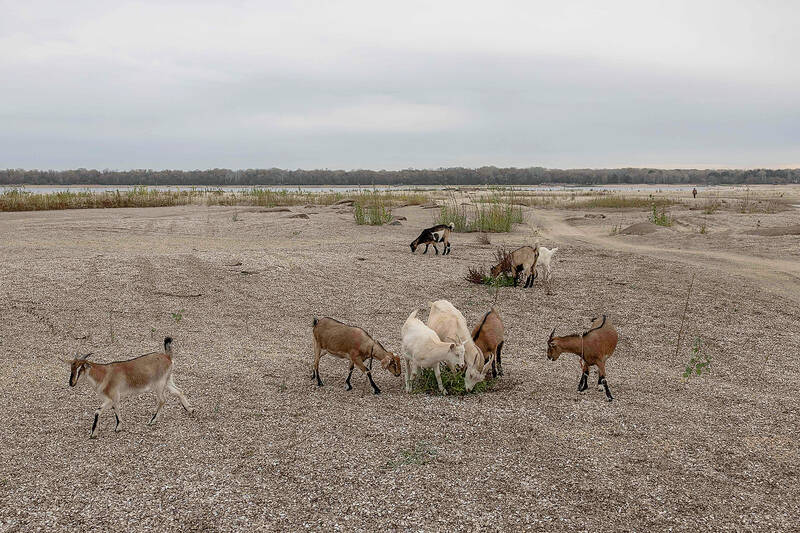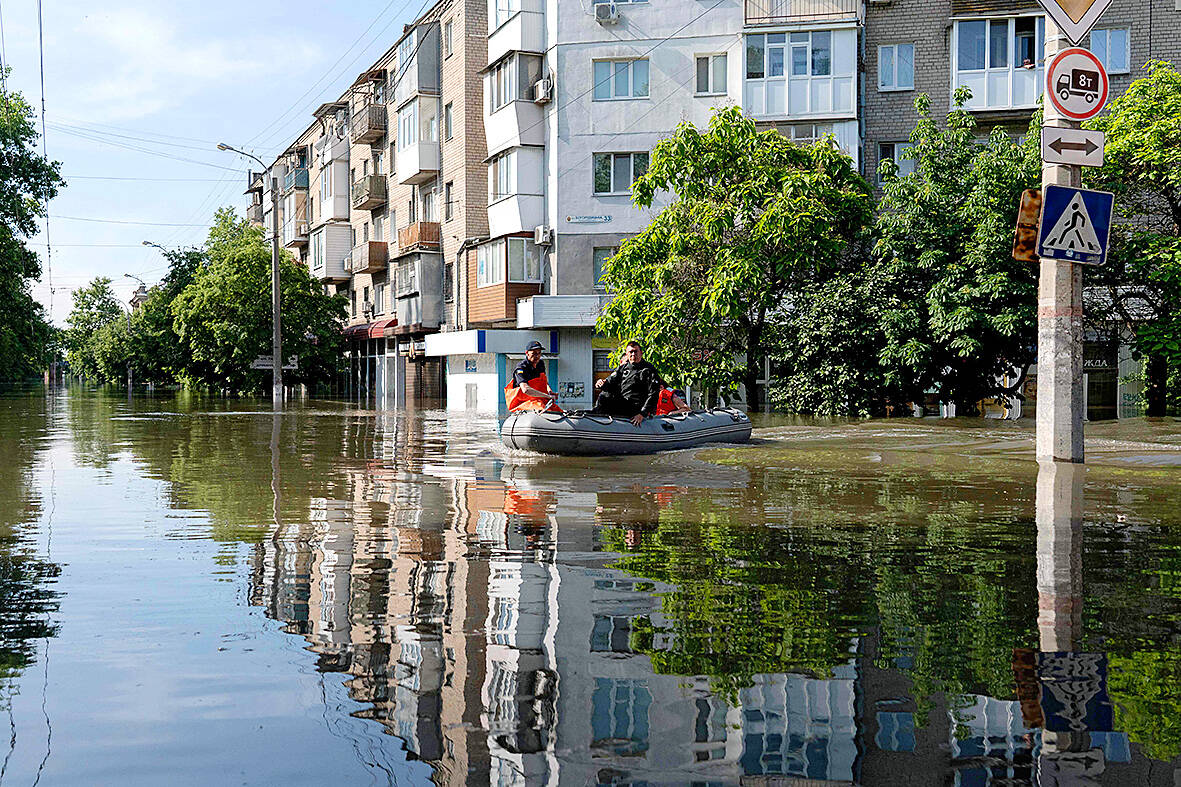The link between climate change and war has been a running theme at COP28, highlighting how many countries suffer from both deadly conflict and environmental disasters.
At the UN climate talks in Dubai, war-torn Gaza, Yemen, Syria and Ukraine and have made their voices heard, complaining about the environmental impact of constant fighting.
“Ecocide,” read a slogan in Ukraine’s pavilion, which was covered with posters detailing the environmental impacts of Russia’s invasion.

Photo: AFP
A display showed the remaining half of a house, one of many hit by the destruction of the Kakhovka dam in June. Russia and Ukraine have traded blame for the disaster.
The other side of the story is how climate destabilization and a scramble for resources can push climate-vulnerable countries into war.
Seventy percent of the most climate-vulnerable countries are also among the weakest politically and economically, according to the World Bank.

Photo: AFP
In Yemen, a parched country on the southern fringe of the Arabian Peninsula, a grinding eight-year civil war has increased pressure on diminishing water supplies, said Yemeni Minister of Water and Environment Tawfiq Al-Sharjabi.
“Conflicts contribute a lot to increasing the suffering of citizens through their impact on environmental resources in general and water resources in particular,” he said.
South Sudan President Salva Kiir Mayardit told world leaders gathering at the start of COP28 that many of his people had been displaced by fighting over water.

Photo: AFP
“Peace and security are clearly affected as a result of climate change,” he said on Saturday, wearing his trademark black cowboy hat.
GAZA: ‘NOTHING LEFT’
At the Palestinian pavilion, the first one ever at a COP, a presentation on the environmental impact of Israel’s occupation was broadcast on a big screen.
“Climate rights: on the other side,” read a slogan on the wall, suggesting that Israel defends its climate while violating the environmental rights of Palestinians living in Gaza and the West Bank. Hadeel Ikhmais, a climate expert with the Palestinian Authority, said that Israeli bombardments in Gaza have destroyed desalination plants, waste-water treatment facilities, and water wells.
“Plans to combat climate change were drawn up based on what was on the ground,” but since the start of the Israel-Hamas war on Oct. 7, “there is nothing left,” she said.
Robert Mardini, head of the International Committee of the Red Cross, said his organization’s climate-related projects in Gaza have all been halted.
“The Gaza Strip is a place where dwindling water resources, reduced quality of water and unpredictable weather events are already a challenge,” he said.
“Some small projects the ICRC had been supporting over the past years really helped the communities cope with the consequences of climate change,” he said, adding that “unfortunately, they are now halted.” Gideon Behar, Israel’s Special Envoy for Climate Change and Sustainability, said at a side event that “one should differentiate between geopolitical issues and the climate issues.”
“In a place like COP we should make our utmost to concentrate on the climate crisis and to deal with geopolitical issues in other arenas.”
FIRE AND FLOODS
After nearly two years of war in Ukraine, experts say the environmental damage will affect generations to come.
As well as the Kakhovka dam disaster, which caused massive, deadly flooding, the conflict has generated about 150 million tons of CO2 emissions, mostly from fuel and fires, a deputy Ukrainian minister said this week, citing a study by the Initiative on GHG Accounting of War.
Nearly 30 percent of Ukraine’s forest zones and about one-fifth of its natural parks have been affected by the war, said Ruslan Strilets, minister of environmental protection and natural resources.
COP28 became the first of the UN’s Conference of the Parties to hold a thematic day dedicated to peace, drawing a link between war and climate change, and urging more funding for the most troubled countries.
Libya, Yemen and Syria, all territorially contested states gripped by war, are mostly locked out of climate finance because they don’t meet the requirements set by donors at multilateral institutions.
All have weak central governments, and with a high risk that aid money will end up in the hands of militants, many donors stay away.

On April 26, The Lancet published a letter from two doctors at Taichung-based China Medical University Hospital (CMUH) warning that “Taiwan’s Health Care System is on the Brink of Collapse.” The authors said that “Years of policy inaction and mismanagement of resources have led to the National Health Insurance system operating under unsustainable conditions.” The pushback was immediate. Errors in the paper were quickly identified and publicized, to discredit the authors (the hospital apologized). CNA reported that CMUH said the letter described Taiwan in 2021 as having 62 nurses per 10,000 people, when the correct number was 78 nurses per 10,000

May 5 to May 11 What started out as friction between Taiwanese students at Taichung First High School and a Japanese head cook escalated dramatically over the first two weeks of May 1927. It began on April 30 when the cook’s wife knew that lotus starch used in that night’s dinner had rat feces in it, but failed to inform staff until the meal was already prepared. The students believed that her silence was intentional, and filed a complaint. The school’s Japanese administrators sided with the cook’s family, dismissing the students as troublemakers and clamping down on their freedoms — with

As Donald Trump’s executive order in March led to the shuttering of Voice of America (VOA) — the global broadcaster whose roots date back to the fight against Nazi propaganda — he quickly attracted support from figures not used to aligning themselves with any US administration. Trump had ordered the US Agency for Global Media, the federal agency that funds VOA and other groups promoting independent journalism overseas, to be “eliminated to the maximum extent consistent with applicable law.” The decision suddenly halted programming in 49 languages to more than 425 million people. In Moscow, Margarita Simonyan, the hardline editor-in-chief of the

Six weeks before I embarked on a research mission in Kyoto, I was sitting alone at a bar counter in Melbourne. Next to me, a woman was bragging loudly to a friend: She, too, was heading to Kyoto, I quickly discerned. Except her trip was in four months. And she’d just pulled an all-nighter booking restaurant reservations. As I snooped on the conversation, I broke out in a sweat, panicking because I’d yet to secure a single table. Then I remembered: Eating well in Japan is absolutely not something to lose sleep over. It’s true that the best-known institutions book up faster